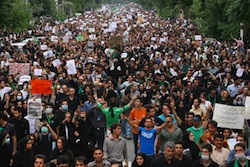Amidst Domestic Turmoil, Iran Attempts to Shift Attention to its Nuclear Program
February 12, 2010
Featured Image
Tensions Grow Towards Iranian Government - MSNBC's Andrea Mitchell Reports [link]
- Karim Sadjadpour of the Carnegie Endowment for International Peace and Joe Cirincione spoke yesterday with Andrea Mitchell about the protests in Iran and developments in Iran's nuclear program.
- Says Cirincione: "We have new analysis coming out , reported in the Washington Post today, based on David Albright at the Institute for Science and International Security organization that Iran's program is in deep technical trouble. They have about 1000 fewer centrifuges operating now than they did a year ago. Those that are outputting are operating at about half the level they were a year ago. They are having serious problems."
Visit msnbc.com for breaking news, world news, and news about the economy
Who Are the Key Obama Players on Iran – Foreign Policy’s The Cable [link]
- As the United States shifts from engagement to sanctions against the Islamic Republic of Iran and the Iranian opposition takes to the streets, a broad and diverse team of officials inside the Obama administration is working on the issue day in and day out.
- But The Cable would like to introduce you to the U.S. government officials who are working on Iran one or two levels down. "The complexity of the problem makes it by necessity a team effort," explained Jon Alterman, director of the Middle East program at the Center for Strategic and International Studies. "There is not one person who is the Iran czar; there are different people who handle different parts of the equation."
Analysis: China Silence Signals Softening on Iran Sanctions - Reuters [link]
- China's silence sometimes speaks volumes, and with growing international momentum for new sanctions on Iran, Beijing's recent reticence suggests it may give ground if it can insulate its oil and business ties.
- Chinese Foreign Minister Yang Jiechi last week urged more diplomacy with Iran, but did not say whether China backed or opposed fresh sanctions.
- "Given Iran's increasingly hard line on the nuclear issue, China feels it can't stand in the way of some sort of international response," said Yin Gang, an expert on the Middle East at the Chinese Academy of Social Sciences, a prominent state think-tank in Beijing.
State Department: No Shift on Missile Defense – Foreign Policy’s The Cable [link]
- U.S. Ambassador to Moscow John Beyrle's recent blog post about ongoing negotiations for a START follow-on agreement does not represent a shift in the U.S. position, despite the articles saying so.
- Written in Russian, Beyrle's post says, "The treaty deals with offensive, not defensive systems, but since we acknowledge a logical link between them, our presidents have agreed that the treaty will contain a provision on the interconnection between strategic offensive and defensive weapons."
- Multiple senior administration officials have told The Cable that this carefully negotiated compromise was well understood to mean that missile defense would be delinked from the START negotiations -- and that was the assumption the American team led by Rose Gottemoeller was working under.
Official: Nuclear Problems Were Adminstrative - Associated Press [link]
- The Air Force on Thursday blamed administrative problems for the decision to remove an Air Force squadron overseeing an underground nuclear weapons cache, detailing another instance of questionable oversight even after the military took steps to correct similar issues.
- Hans Kristensen, a longtime watcher of nuclear weapons issues at the Federation of American Scientists, based in Washington, said the removal of the NCOs is a likely indication the squadron's problems ran deeper than one failed surety inspection.
- The New Mexico unit was the military's third since 2003 to be temporarily stripped of its duties over concerns about how the weapons were handled or documented.
- Note: The Federation of American Scientists is a Ploughshares Fund grantee.
A View from the Dark Side
The Case for Striking Iran Grows - John Bolton in the Wall Street Journal [link]
- President Mahmoud Ahmadinejad announced on Sunday that Iran would enrich uranium to 19.75% purity for Tehran's research reactor. Yesterday he claimed to have done just that, making Iran "a nuclear state."
- Advocating a "regime of sanctions" against Iran, Mr. Obama stressed that his purpose was to "indicate to them how isolated they are from the international community as a whole." That raises the question of why being isolated would bother Iran. The regime's leaders believe they are implementing God's will, so why should they fear being isolated from mere mortals—even Barack Obama?
- Mr. Obama's open-handed, open-doored, two-track approach just won't die, despite Secretary of State Hillary Clinton conceding last week that Iran has not "unclenched its fist" as Mr. Obama called for in his inaugural address. And Defense Secretary Robert Gates has said, "the only path that is left to us at this point . . . is that pressure track." Perhaps the president and his national-security cabinet should talk more often.
- America's central focus must be to prevent Iran from obtaining nuclear weapons in the first place. Doing so requires decisive, and likely military, action now, since there is essentially no likelihood that an Obama-inspired "regime of sanctions" will achieve that objective.



